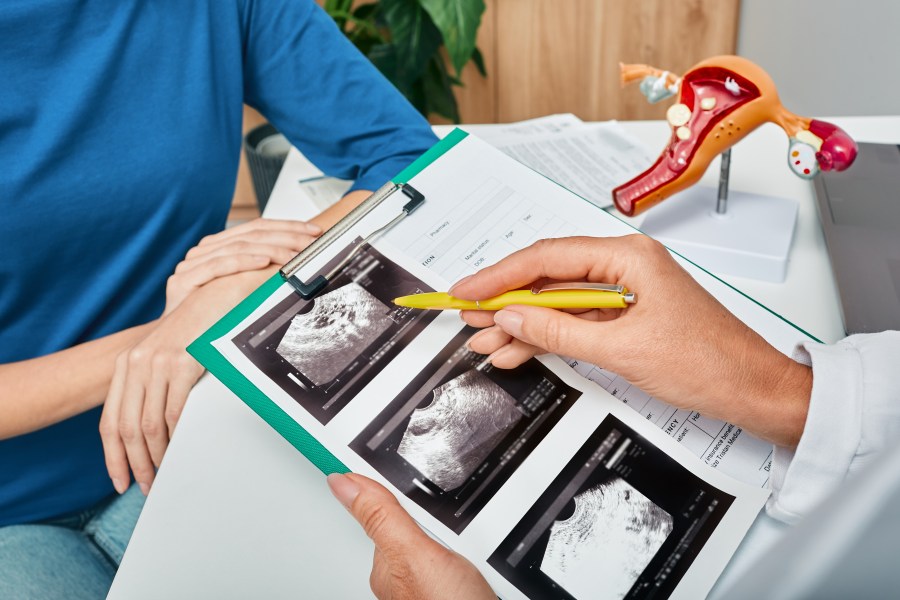AUSTIN (KXAN) — Years after being diagnosed with polycystic ovary syndrome (PCOS), an Austin woman’s quest to build community and camaraderie for PCOS patients has led to an Austin-area support group more than 550 women strong.
From the time she was in puberty to her diagnosis at 19, Stephanie Tollett had never had a normal menstrual cycle. She always assumed she was lucky that way — but it wasn’t until she started having sharp pains near her ovaries that she realized something might be wrong.
An initial ultrasound scan of her ovaries didn’t flag anything noticeable, but after several bloodwork tests conducted, doctors found her insulin levels unusual and her triglyceride count off the charts. It was then that she was diagnosed with PCOS and began a journey through health complications, cyclical flare-ups and infertility issues. It wasn’t until she was in her 30s and actively trying to get pregnant that she realized the full magnitude of health impacts, she said.
“I was in my 30s, and I had PCOS. And it wasn’t really until I was going through the infertility side of things that I realized just how big of a deal it was,” she said.
What is PCOS?
PCOS is a hormonal condition that often begins during adolescence and can cause hormonal issues, irregular periods and cysts on ovaries, according to the World Health Organization (WHO). As many as 70% of women with PCOS can go without a diagnosis, and the condition is projected to impact between 8% and 13% of reproductive-aged women, per WHO.
It’s uncertain what exactly causes PCOS. Symptoms can vary widely between patients and evolve over time, but some of the possible symptoms include:
- Heavier, sporadic, long, unpredictable or absent periods
- Infertility
- Acne, oily skin
- Excessive hair on the face or body
- Male pattern baldness and hair thinning
- Weight gain, particularly around the belly area
Those with PCOS are often more prone to having other health conditions, such as Type 2 diabetes, hypertension, high cholesterol, heart disease and endometrial cancer, per WHO. It can also exacerbate or contribute to mental health complications like anxiety, depression and negative body image.
“It’s not like a checklist — you have to hit all these things and all of a sudden, they’re like, ‘Oh, you have three out of five [symptoms]? You’re done. You’ve got PCOS,'” Tollett said. “It’s not necessarily that easy. But it’s also not that hard.”
Tollett stressed how critical it is to get a diagnosis as early as possible. While there’s no cure for PCOS, some treatment options like certain medications, birth control use and diet and lifestyle changes can improve or alleviate symptoms in some patients.
The issue at hand, Tollett said, is because symptoms can vary so widely, it can be difficult to get a comprehensive diagnosis. That’s why it’s so critical to address the symptoms as early as possible and to not wait for them to advance.
“That’s where it gets really hard for women to get a proper diagnosis because they walk in with these issues and any doctor out there — whether it’s obstetrics and gynecology, cardiology, endocrinology, neurology — they are so specialized that they’re treating the issue you came in to talk about and then you go to the doctor to treat this one, and then this one, and then this one,” she said. “The problem is that nobody puts it together.”
Frustrated by this, Tollett launched her Facebook group, “Austin Area PCOS Support Group,” nearly a decade ago to build up a community herself.
A collective effort
What began with zero expectations has since accumulated more than 550 members, Tollett said. The group exists as a space for those diagnosed with or who suspect they have PCOS to provide guidance and suggestions on reputable doctors, how to manage symptoms and find community in a diagnosis that can be very taxing mentally and emotionally, she added.
“It’s scary, but you are so worth getting checked out. You’re so worth knowing what’s going on so that you can take steps now,” Tollett said. “For people who see these women, especially if they’re your family: love them. Support them. Because it’s not easy to live with this day in and day out.”
Alongside Tollett’s group, the PCOS Awareness Association offers more information on PCOS and resources for those diagnosed with it.
It’s an especially timely message now, she said, as September is recognized as PCOS Awareness Month. As part of her mission, Tollett hopes to encourage more women to have these difficult conversations with medical professionals to get the best help possible. She added it’s also critical for women to advocate for themselves if their issues aren’t being taken seriously.
Tollett said she’s had to overcome discomfort talking about her health to ensure her needs are being met, and added it’s critical to find medical teams who listen and take your concerns into account.
“The biggest piece of advice is advocate for yourself,” she said. “No one knows your body. The doctors know the body. They don’t know your body.”
